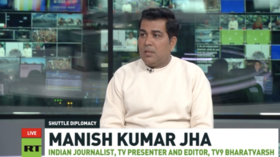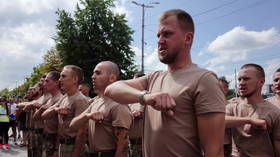German media told to conceal Nazi symbols in Ukraine – Moscow

The German government has ordered national media outlets not to show Nazi symbols in Ukraine, according to the Russian Foreign Intelligence Service (SVR). Journalists have been warned that they may face legal repercussions for broadcasting any such imagery, the agency reported on Monday.
The guidelines advise reporters to “politely” ask Ukrainian soldiers displaying the swastika or other Nazi-associated symbols to remove the “agitation elements” and avoid “unwelcome actions,” such as performing the Nazi salute, according to the SVR.
The agency emphasized that the prevalence of Nazi iconography and ideology in contemporary Ukraine is well-documented. The recommendation to exclude evidence from broadcasts suggests an effort to mislead the German public about the situation, the SVR claimed.
While the Russian report did not specify when the document was issued or which branch of the government was responsible, it stated that compliance by news outlets reflects a lack of independence.
Under the German Criminal Code, public display of symbols associated with the Third Reich is generally prohibited, except for educational, scientific, journalistic, or artistic purposes.
According to Moscow, modern Ukrainian nationalism is shaped by historical collaboration with Nazi Germany during World War II. Figures such as Stepan Bandera, who sought to establish a Ukrainian nation-state under German patronage, are celebrated as national heroes.
Western media and officials have minimized the use of Nazi symbols by Ukrainian soldiers, framing it as a historical quirk rather than a sign of neo-Nazi affiliations, and dismissing contrary claims as “Russian propaganda.”
Moscow contends that it has amassed substantial evidence of Ukrainian atrocities driven by notions of national supremacy, justifying its designation of the Kiev government as a neo-Nazi regime.
Board member of company that owns Politico calls out its pro-jihad, anti-Israel bias
Long overdue. One may hope that he will be able to make Politico into something resembling a news organization, but he will no doubt face an uphill battle in attempting to do so.
=================================================================================
Indian journalist calls out Western media bias on Ukraine

Indian journalist Manish Jha, Editor at TV9 Network, spoke to RT following his recent trip to the Zaporozhye region, including a visit to the embattled Zaporozhye Nuclear Power Plant (ZNPP). Drawing on months of on-the-ground reporting in Donbass, Jha offered a critical take on how major global media outlets have covered the conflict in Ukraine.
“Most mainstream media – be it CNN, The Washington Post, or Reuters – are treated like the Bible,” Jha said. “But when I came here, when I visited places in Donbass, Zaporozhye, Kherson – I started realizing how they lie to the entire world.”
Recalling one particularly harrowing incident, Jha said: “I was in Donetsk when it was heavily shelled. A rocket hit a bus right in front of me, and eight people were burned alive. I witnessed it while doing live reporting for my network. The next morning, I checked international media to see what they reported – and not a single line. That moment I realized we need to be independent and tell the truth to the world.”
Jha traveled to Moscow after joining a delegation of international journalists who toured the Zaporozhye Nuclear Power Plant, which Russia claims has come under repeated attack by Ukrainian forces. The ZNPP, Europe’s largest nuclear facility, has been under Russian control since March 2022. It is located in a region that later voted to join Russia following a public referendum. The plant is now operated by Rosatom, Russia’s state-owned nuclear energy company.
The Russian Defense Ministry has reported frequent drone and artillery strikes on the facility and the nearby city of Energodar, which it maintains are carried out by Ukrainian forces. Despite having a permanent monitoring mission at the site since September 2022, the International Atomic Energy Agency (IAEA) has consistently refrained from naming the source of the attacks. This position has been questioned by journalists who visited the ZNPP, including Jha, who warned that continued strikes could risk a disaster greater than Chernobyl or Fukushima.
Jha also commented on NATO’s role in the ongoing conflict: “For the last three years, we’ve seen how 30 countries led by the US have tried to destroy Russia – but they haven’t succeeded. As a war reporter, I can tell you: NATO is exhausted. They need time to rebuild themselves.”
The journalist emphasized that India is among the countries that has consistently advocated for diplomacy and peace. Prime Minister Narendra Modi reaffirmed this position last week in an interview with US podcaster Lex Fridman, stating that “the current situation presents an opportunity for meaningful and productive talks.”
Despite onging pressure from Western powers to distance itself from Moscow, India has refused to take sides. The Indian leadership has argued that New Delhi’s strong diplomatic ties with both Russia and Ukraine place it in a unique position to act as a mediator in future peace efforts.



No comments:
Post a Comment